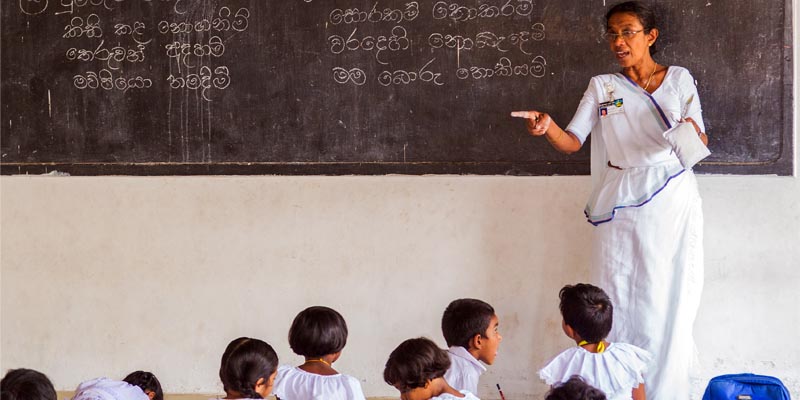Raising Sri Lankan teachers’ awareness and understanding of specific learning difficulties
-
Case study
- Culture and Communication
Students with learning difficulties can be at a serious disadvantage if their condition is not recognised. In Sri Lanka teachers aren’t trained to spot the symptoms of their students’ learning difficulties but our researchers are helping to change this.

The issue
It is estimated that 10 per cent of the world’s population has some form of specific learning difficulty (SpLD) such as dyslexia, dyscalculia, dyspraxia or ADHD. If identified early in life appropriate approaches can help young people with SpLDs to achieve learning goals within their grasp.
In Sri Lanka, children with SpLDs are often deprived of the opportunity to achieve their educational goals, as most teachers have minimal understanding of such difficulties. This is mainly due to minimal attention being paid to SpLDs in both pre-service and in-service teacher education programmes.
This project was designed to raise Sri Lankan teachers’ awareness and understanding of SpLDs, and to introduce changes into the mainstream education system in order to better accommodate learners with SpLDs.
The research
This project makes use of a tailor-made set of evidence-informed teacher training materials. For example, it is known that learners with SpLDs tend to have a lower working memory capacity. Due to this, they encounter difficulties in processing language.
In one of our studies, we investigated how working memory capacity influences language processing ability. We asked adult learners of English to read texts in order to process a grammatical construction. We also measured their working memory capacity using several tests. Our findings indicated that lower working memory capacity is negatively associated with processing of grammar. These findings are reported in Bilingualism: Language and Cognition.
In a separate study, we also identified that teachers in Sri Lanka have minimal understanding of difficulties faced by learners with SpLDs. These findings are reported in TESOL Quarterly.
The outcome
The project was conducted in two phases. The first phase was aimed at stakeholders in the English language education field in Sri Lanka. In this phase 271 teacher trainers, policy-planners, language test-developers, curriculum and textbook-writers, and a cross-section of English language teachers were trained. Teacher trainers represented all of Sri Lanka’s districts and they are now engaged in cascading the training to teachers in their areas. The outcomes of this phase were reported in TESOL Quarterly.
The second phase was aimed at stakeholders in primary education. This included 493 participants from the Ministry of Education, National Institute of Education, Department of Examinations, Education Publications Department and National Colleges of Education (pre-service colleges). After the training, the Department of Examinations and Education Publications Department designed their own internal guidelines on the revisions necessary for textbooks and national exams in order to make them more inclusive. In this way our research had an impact on education throughout the country. Furthermore, a teacher training module on SPLDs was developed and the Ministry of Education introduced it to all pre-service teacher training colleges in the country as a new component of their curriculum.
As the third step, we are currently working to extend this training into in-service teacher education in Sri Lanka.
Read the full paper: Bilingualism: Language and Cognition
Read more about the project's outcomes in the TESOL Quarterly paper

Bimali Indrarathne
Dr Indrarathne’s interests are in the area of second language acquisition and how cognitive aspects are related to input processing. She works with teachers, teacher educators and policy planners on several research and teacher education projects related to language education and inclusive practices.
